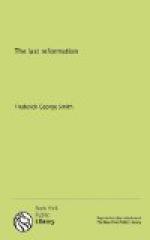In the mind of the author of the Epistle to Diognetus, the grand central thought is the incarnation and the spiritual presence of Christ in redeemed humanity, by which they are led to the “free imitation of God,” as a result of which they become to the world what the soul is to the body—its life and the means of holding it together. This teaching is an epitome of the Greek theology developed later by Clement of Alexandria, Origen, and Athanasius. But in Papias, who attaches much importance to oral traditions that “came from the living and abiding voice”; in Ignatius, who exalts the bishop above other presbyters; and in Clement, who, writing as a Roman, is concerned with matters of administration and subordination to authority—in these we discern the beginnings of the Latin theology developed later by Tertullian, Irenaeus, Cyprian, and Augustine, which produced the papacy, and which, as we shall show, has in a great measure dominated the ecclesiastical thought of the world until the present day.
[Sidenote: The Ante-Nicene age]
After emerging into the clear field of historic Christianity in the time of Justin Martyr, we find everywhere evidences of a rapidly developing apostasy. In one respect we approach an examination of the Ante-Nicene church with feelings of admiration. This was a heroic age, an age of Christian martyrs. The struggles of Christianity against the powers of heathenism enthroned in the Roman Empire and throughout the world form a bright chapter in the annals of historic deeds and supreme loyalty to lofty ideals. When we view the subject from this angle, it would almost seem to be an act of irreverence or of sacrilege to call in question the doctrines and practises of that period when the church was baptized by fire and waded through rivers of blood. Reverence for the martyrs and for their noble efforts to extend the cause of Christ is praiseworthy, but in justice to truth, we must remember that even the martyrs were not inspired teachers commissioned to build a model for all succeeding ages. That they were heroic does not prove them infallible. We should never hesitate, therefore, to compare their teaching with the pure doctrines of the Word of God, and wherein there is any lack of harmony, we should be guided by the truth as it is in Jesus.
However much we may admire the early church fathers, we can not help noticing the sharp contrast between them and the first apostles; between their writings and the sublime, inspired teaching of the divine Word. If, after reading Paul, Peter, or John, we turn to Tertullian, Irenaeus, or Cyprian, we instinctively realize that we have, so to speak, been transferred from sunny Italy to frigid Siberia. We are conscious of a change to another era, and to another country. Notwithstanding the fact that we find numerous familiar objects, we know that we are moving in another atmosphere amid foreign surroundings.
[Sidenote: Growth of ritualism]




